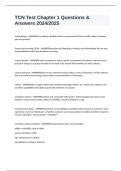TCN Test Chapter 1 Questions &
Answers 2024/2025
anthropology - ANSWERSan academic discipline that is concerned with the scientific study of humans,
past and present
Transcultural nursing (TCN) - ANSWERSdescribes the blending of nursing and anthropology into an area
of specialization within the discipline of nursing
culture-specific - ANSWERSrefers to particular values, beliefs, and patterns of behavior that tend to be
special or unique to a group and that do not tend to be shared with members of other cultures
culture-universal - ANSWERSrefers to the commonly shared values, norms of behavior, and life patterns
that are similarly held among cultures about human behavior and lifestyles
culture - ANSWERSthe complex whole that includes knowledge, beliefs, art, morals, law, customs, and
any other capabilities and habits acquired by members of a society
nonethnic cultures - ANSWERScultures not associated with racial or ethnic background such as ones
based on socioeconomic status, ability or disability, sexual orientation, or age
socioeconomic status - ANSWERSeconomic and sociological combined total measure of a person's work
experience and of an individual's or family's economic and social position in relation to others, based on
income, education, and occupation. examples??
nonethnic culture examples - ANSWERSsocioeconomic: poor, rich, homeless
ability or disability: deaf or blind
sexual orientation: LGBT
age: adolescence or elderly
occupational: nursing or business
, primary level of culture - ANSWERSrefers to the implicit rules known and followed by members of the
group, but seldom stated or made explicit
secondary level of culture - ANSWERSrefers to underlying rules and assumptions that are known to
members of the group but rarely shared with outsiders
tertiary level of culture - ANSWERSrefers to explicit or public face that is visible to outsiders, including
dress, rituals, cuisine, and festivals
subculture - ANSWERSrefers to groups that have values and norms that are distinct from those held by
the majority within a wider society
ethnicity - ANSWERSthe perception of oneself and a sense of belonging to a particular ethnic group or
groups
race - ANSWERSrefers to a group of people who share such genetically transmitted traits as skin color,
hair texture, and eye shape or color
culturally congruent nursing care - ANSWERScare that are based on 3 modes of nursing decisions and
actions: culture care preservation and/or maintenance, culture care accommodation and/or negotiation,
and culture care repatterning and/or restructuring
ethnonursing research - ANSWERSa qualitative research method created by Leininger; first research
methodology developed by a nurse for use in studying topics relevant to nursing
cultural competence - ANSWERSrefers to the compolex integration of knowledge, attitudes, beliefs,
values, behaviors, skills, practices, and cross-cultural encounters that include effective communication
and the provision of safe, affordable, quality, accessible, evidence-based, and efficacious nursing care for
individuals, families, groups, and communities of diverse and similar cultural backgrounds
Transcultural interprofessional practice model - ANSWERSconsists of the following interconnected and
interrelated components: the context from which people's health-related values, attitudes, beliefs, and
practices emerge (interprofessional health care team, communication, and problem-solving process)





